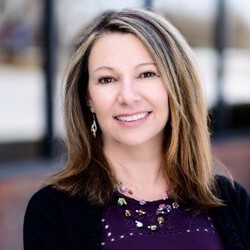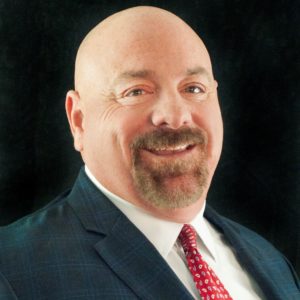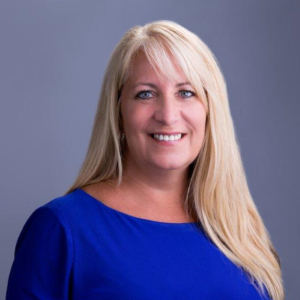Ways to Use Music to Benefit Senior Care Residents: Part I
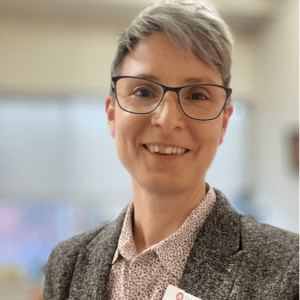
Carrie Deppong, director of therapeutic recreation, United Hebrew of New Rochelle
Humans have enjoyed music for thousands of years, but music offers more benefits than just enjoyment. A 2012 study found that music could help to reduce pain and depression, and a 2016 study found that music could lower blood pressure and heart rate. Those are just a few of the many studies being done into the positive effects of music.
Music therapy strategically uses music for its many benefits. From socialization opportunities to reduced stress and muscle tension, humans – residents in senior care settings stand to benefit from music in many ways. We’ll share how two different senior care communities are using music differently to benefit their residents.
How United Hebrew of New Rochelle Uses Music Therapy in Multiple Ways
United Hebrew of New Rochelle, located in New Rochelle, New York, has structured its programming to maximize residents’ opportunity to enjoy the benefits of music. Carrie Deppong, Director of Therapeutic Recreation at United Hebrew of New Rochelle, explains that the community has one music therapist on staff in the recreation department.
The community works with an additional music therapist on a consultancy basis, and he is able to provide programming during times when the staff music therapist isn’t on campus. “This extends the time that music therapy is available to our residents, which works out really well,” explains Deppong. “Our music therapists can do other activities, like individual sessions while one is doing a group session. Or, they can do other programming on another unit to get more residents involved.”
Embracing the Music & Memory Program
In addition to the work of the music therapists, Deppong describes how the community uses the Music & Memory program. The program, which provides training to care professionals about how to set up personalized music playlists for their residents, uses music to tap into deep memories that haven’t been lost to dementia. Residents can listen to their personalized playlists on devices with headphones; residents who can’t tolerate headphones use Bluetooth speakers in their rooms.
The community started the program in 2019 and was able to continue it throughout the pandemic. “The Music & Memory is a much more individualized session, which we do primarily with people with dementia,” says Deppong. “We went through training to implement the program. It focuses on reducing stress and anxiety and behaviors that might be caused by dementia or other issues that residents have that may get in the way of their overall joy and participation in the activities of daily living. We’ve seen less behaviors because of the program.”
To support the program, some family members brought in devices for residents to use. In these cases, family members already had music downloaded that they knew their loved one would like to listen to. Family members also gave input that helped United Hebrew staff to develop individualized playlists that would most appeal to residents’ individual interests. “We were able to tailor the programming based on the family’s reactions to the music, as well,” says Deppong. “We were able to use these individualized playlists when we couldn’t have group activities because of the pandemic.”
Additional Strategies to Integrate Music
“United Hebrew has an important focus on music in general, whether it be through speakers in our hallways to entertainers coming in,” explains Deppong. Before Thanksgiving, the community held a talent show featuring residents and staff, and families are still talking about it. The talent show gave residents a chance to see their peers performing. “Some residents aren’t really able to carry on a conversation, but they remember all the words to the music,” says Deppong. “It’s a really powerful tool that we love to use here.”
Navigating the Pandemic
The COVID-19 pandemic proved challenging for United Hebrew’s music therapy programs, particularly the group activities. “We were able to keep the music going with our staff being so flexible, and being willing to cross over into those activities,” Deppong explains. “Our therapists on staff provided music. Any staff members that had musical interests helped to put on programming, as well. It was a very big team effort, and we were very happy with United Hebrew coming together in such a really horrible moment.”
Once United Hebrew was able to bring performers back in, resident participation was much greater than it had been pre-pandemic. “I think music saved our life during that time,” says Deppong.
Implementing Music Therapy in Your Senior Care Community
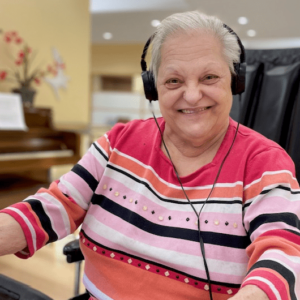 Deppong recommends that any senior care community interested in implementing music therapy visit the Music & Memory website. The site offers lots of useful tools, and you can access those tools without signing up for the program and training.
Deppong recommends that any senior care community interested in implementing music therapy visit the Music & Memory website. The site offers lots of useful tools, and you can access those tools without signing up for the program and training.
She also recommends that you talk to your residents and find out more about their lives, like if they served in the military and what kind of jobs they’ve held. Take a survey of residents’ favorite music and put playlists together.
To develop a music library, Deppong suggests asking family members to donate music, including CDs and iTunes cards. “Download as much music into a library as you can, put specific songs on different playlists from the library, and see what works for people.” She notes that there are plenty of budget-friendly music sources, including the radio, Spotify, Pandora, and YouTube, that communities can use, too.
She also highlights how you can use music in any type of activity, even activities to promote range of motion. “You can’t turn on the TV or go anywhere without hearing music – it’s a basic part of the world we almost forget about because it’s always with us,” she says. “The song from your childhood or wedding brings those emotions back, and it really just kind of opens up that part of your memory that might not have been accessible before. It brings everyone back to the best self that they had.”
In an upcoming story, we’ll feature another facility that effectively uses music to engage and support its residents.

Paige Cerulli is a contributing writer to i Advance Senior Care.
Related Articles
Topics: Activities , Alzheimer's/Dementia , Featured Articles , Information Technology , Resident Care , Technology & IT


